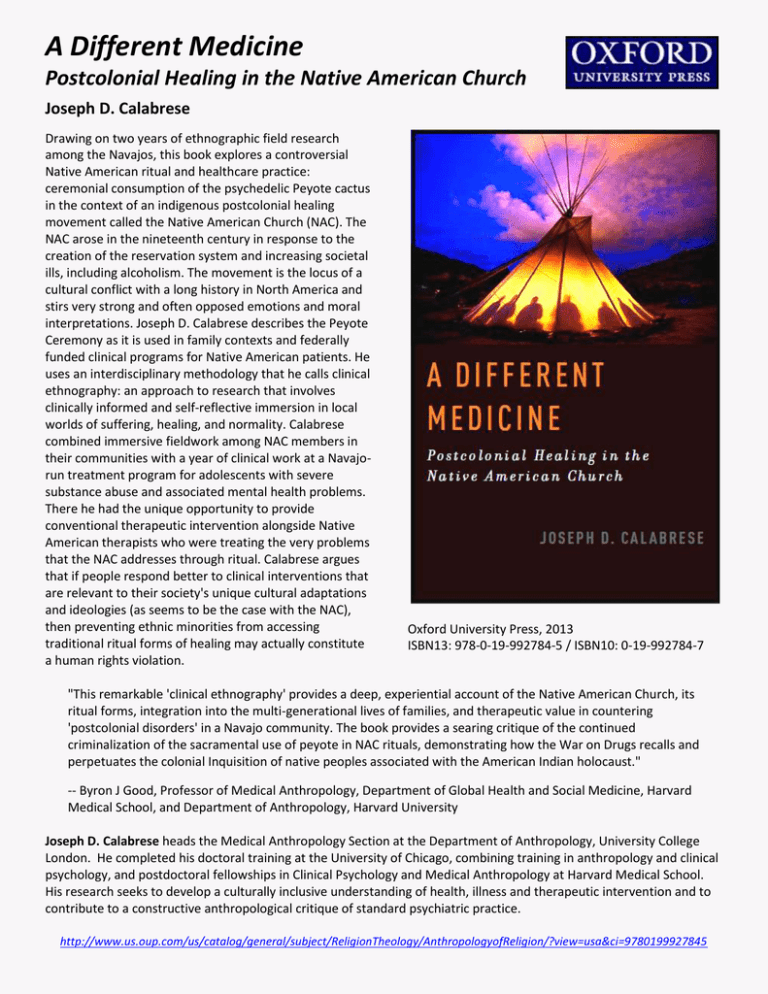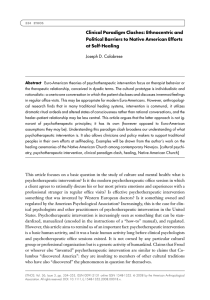A Different Medicine Postcolonial Healing in the Native American Church
advertisement

A Different Medicine Postcolonial Healing in the Native American Church Joseph D. Calabrese Drawing on two years of ethnographic field research among the Navajos, this book explores a controversial Native American ritual and healthcare practice: ceremonial consumption of the psychedelic Peyote cactus in the context of an indigenous postcolonial healing movement called the Native American Church (NAC). The NAC arose in the nineteenth century in response to the creation of the reservation system and increasing societal ills, including alcoholism. The movement is the locus of a cultural conflict with a long history in North America and stirs very strong and often opposed emotions and moral interpretations. Joseph D. Calabrese describes the Peyote Ceremony as it is used in family contexts and federally funded clinical programs for Native American patients. He uses an interdisciplinary methodology that he calls clinical ethnography: an approach to research that involves clinically informed and self-reflective immersion in local worlds of suffering, healing, and normality. Calabrese combined immersive fieldwork among NAC members in their communities with a year of clinical work at a Navajorun treatment program for adolescents with severe substance abuse and associated mental health problems. There he had the unique opportunity to provide conventional therapeutic intervention alongside Native American therapists who were treating the very problems that the NAC addresses through ritual. Calabrese argues that if people respond better to clinical interventions that are relevant to their society's unique cultural adaptations and ideologies (as seems to be the case with the NAC), then preventing ethnic minorities from accessing traditional ritual forms of healing may actually constitute a human rights violation. Oxford University Press, 2013 ISBN13: 978-0-19-992784-5 / ISBN10: 0-19-992784-7 "This remarkable 'clinical ethnography' provides a deep, experiential account of the Native American Church, its ritual forms, integration into the multi-generational lives of families, and therapeutic value in countering 'postcolonial disorders' in a Navajo community. The book provides a searing critique of the continued criminalization of the sacramental use of peyote in NAC rituals, demonstrating how the War on Drugs recalls and perpetuates the colonial Inquisition of native peoples associated with the American Indian holocaust." -- Byron J Good, Professor of Medical Anthropology, Department of Global Health and Social Medicine, Harvard Medical School, and Department of Anthropology, Harvard University Joseph D. Calabrese heads the Medical Anthropology Section at the Department of Anthropology, University College London. He completed his doctoral training at the University of Chicago, combining training in anthropology and clinical psychology, and postdoctoral fellowships in Clinical Psychology and Medical Anthropology at Harvard Medical School. His research seeks to develop a culturally inclusive understanding of health, illness and therapeutic intervention and to contribute to a constructive anthropological critique of standard psychiatric practice. http://www.us.oup.com/us/catalog/general/subject/ReligionTheology/AnthropologyofReligion/?view=usa&ci=9780199927845








